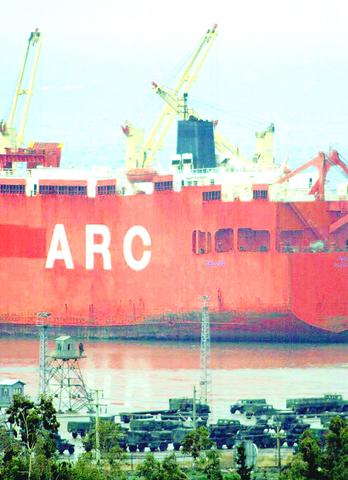Turkish leader Tayyip Erdogan was quoted yesterday as saying Turkey would not open its bases to US troops unless Washington gave written guarantees on aid and Turkey's role in any Iraq war.
As Ankara sought to drive a hard bargain with Washington, Turkish military officials said thousands of Turkish troops had entered northern Iraq in the last few days to head off feared incursions by Turkish Kurdish guerrillas encamped there.
NATO ally Turkey has dragged its feet on a parliamentary vote to allow American troops to deploy on its soil, throwing into doubt US plans to launch a secondary northern front against Iraq, accused of building weapons of mass destruction.

PHOTO: REUTERS
"This will not happen without a signature," Erdogan told Yeni Safak, an Islamist-leaning newspaper. "We don't have a date in mind. Only when we reach agreement will we send the [troop deployment] request to parliament."
Washington has expressed frustration over Turkey's delay in accepting a multi-billion-dollar aid package in exchange for US access to bases and sea ports, which could serve as staging posts for a war against neighboring Iraq.
Turkey wants a formal assurance the US Congress will act quickly to release financial aid, Erdogan said.
He also said fears of social upheaval and instability in the region outweighed Turkey's concerns over whether its crisis-hit economy could withstand the shock of an Iraq war.
"It's ridiculous to call this bargaining for dollars. The political and military dimensions are far more important, the economic dimension comes after these," Erdogan said.
Turkey argues that its economy lost more than US$30 billion after the 1991 Gulf War and that it had too little say in the new political order in the area, especially northern Iraq.
The White House said on Wednesday night its latest offer, of US$6 billion in grants and up to US$20 billion in loans, was final. Official sources here said contacts overnight with Washington had brought some progress, but gave no details.
Later in the day Prime Minister Abdullah Gul was due to meet Turkey's top general and President Ahmet Necdet Sezer, who argued this week that no parliament vote on US troops was possible without a second UN vote authorizing use of force against Iraq.
Military officials and local authorities in southeast Turkey said that up to 7,000 Turkish troops, with armored vehicles and tanks, had rolled into north Iraq in recent days in response to a perceived threat by Turkish Kurdish guerrillas there.
"The intelligence that has reached us in recent days shows KADEK militants moving toward the border and preparing for action. We have been forced to take military precautions," a military official said.
KADEK, formerly called the PKK, is a separatist movement that waged an armed campaign for a Kurdish homeland in southeast Turkey that killed 30,000 people, mainly Kurds, in the 1980s and 1990s.
The military says a war next door could reignite unrest in the impoverished area bordering semi-autonomous northern Iraq, administered by Iraqi Kurds since the end of the 1991 Gulf War.

The CIA has a message for Chinese government officials worried about their place in Chinese President Xi Jinping’s (習近平) government: Come work with us. The agency released two Mandarin-language videos on social media on Thursday inviting disgruntled officials to contact the CIA. The recruitment videos posted on YouTube and X racked up more than 5 million views combined in their first day. The outreach comes as CIA Director John Ratcliffe has vowed to boost the agency’s use of intelligence from human sources and its focus on China, which has recently targeted US officials with its own espionage operations. The videos are “aimed at

STEADFAST FRIEND: The bills encourage increased Taiwan-US engagement and address China’s distortion of UN Resolution 2758 to isolate Taiwan internationally The Presidential Office yesterday thanked the US House of Representatives for unanimously passing two Taiwan-related bills highlighting its solid support for Taiwan’s democracy and global participation, and for deepening bilateral relations. One of the bills, the Taiwan Assurance Implementation Act, requires the US Department of State to periodically review its guidelines for engagement with Taiwan, and report to the US Congress on the guidelines and plans to lift self-imposed limitations on US-Taiwan engagement. The other bill is the Taiwan International Solidarity Act, which clarifies that UN Resolution 2758 does not address the issue of the representation of Taiwan or its people in

US Indo-Pacific Commander Admiral Samuel Paparo on Friday expressed concern over the rate at which China is diversifying its military exercises, the Financial Times (FT) reported on Saturday. “The rates of change on the depth and breadth of their exercises is the one non-linear effect that I’ve seen in the last year that wakes me up at night or keeps me up at night,” Paparo was quoted by FT as saying while attending the annual Sedona Forum at the McCain Institute in Arizona. Paparo also expressed concern over the speed with which China was expanding its military. While the US

SHIFT: Taiwan’s better-than-expected first-quarter GDP and signs of weakness in the US have driven global capital back to emerging markets, the central bank head said The central bank yesterday blamed market speculation for the steep rise in the local currency, and urged exporters and financial institutions to stay calm and stop panic sell-offs to avoid hurting their own profitability. The nation’s top monetary policymaker said that it would step in, if necessary, to maintain order and stability in the foreign exchange market. The remarks came as the NT dollar yesterday closed up NT$0.919 to NT$30.145 against the US dollar in Taipei trading, after rising as high as NT$29.59 in intraday trading. The local currency has surged 5.85 percent against the greenback over the past two sessions, central